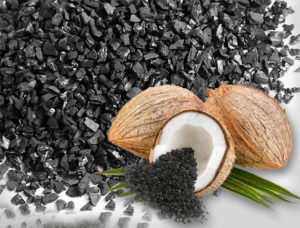
Uncovering the Untapped Potential: The Advantages of Sri Lanka’s 100% Premium Coconut Shell-Activated Carbon Filters in Enhancing Water Quality and Safety.
Industries around the world, particularly those involved in water supply and treatment, are undergoing a significant transformation in response to the global sustainability movement. This shift is fueled by the increasing emphasis on eco-friendly purification methods and the urgent need for clean water access in sectors like food production. Water is a critical resource that sustains agriculture, industry, and human life itself. Despite water being abundant on our planet, finding safe and drinkable sources is a daunting task in many areas. This scarcity highlights the importance of efficient water purification methods.
In light of these challenges, the water treatment industry is adapting to this new landscape by embracing more sustainable and environmentally conscious approaches to purification. Traditional methods, which often rely on harsh chemicals and energy-intensive processes, are being reassessed and replaced with greener alternatives whenever possible. An exciting development is the use of 100% premium coconut shell-activated carbon filters sourced from places like Sri Lanka, renowned for their exceptional ability to absorb impurities. These filters not only provide highly effective water purification but also minimize the negative environmental impact associated with conventional methods.
These remarkable coconut shell-activated carbon filters from Sri Lanka go beyond the conventional means of water purification. Thanks to their highly porous structure, they boast an extensive surface area that facilitates the effective removal of impurities like chlorine, volatile organic compounds (VOCs), heavy metals, and even organic compounds such as herbicides, pesticides, and industrial chemicals. What sets them apart is not just their purification prowess but their ability to elevate the taste and freshness of water, appealing to discerning consumers. This transformation enhances your daily drinking experience, making water more refreshing and safer. In turn, it promotes improved hydration and overall well-being. For further details that may pique your interest, read on:

Enhanced Taste and Freshness: Coconut shell-activated carbon filters excel at reducing chlorine levels and eliminating the unpleasant odor that can negatively impact the taste of water. While chlorine is necessary for disinfecting municipal water supplies, it often leaves behind a chemical aftertaste and smell that discourage consumers. By utilizing these advanced carbon filters, the issue of chlorine and its odorous effects is effectively resolved.
This not only ensures that the water meets rigorous safety standards but also greatly improves its taste and freshness. Removing the overpowering presence of chlorine transforms the water into a purer and more refreshing drinking experience, encouraging individuals to consume more water and promoting better hydration. This improvement guarantees that your drinking water is not only safe but also provides a taste and aroma reminiscent of natural spring water. As a result, these filters enhance the quality of your daily hydration routine, making it more enjoyable and appealing.

Exceptional Adsorption Abilities: Coconut shell-based activated carbon filters are renowned for their outstanding adsorption capabilities, primarily due to the unique and highly porous structure of coconut shell carbon. This specific type of activated carbon boasts an internal surface area that can be exceptionally vast, sometimes exceeding 1,000 square meters per gram. This expansive surface area plays a crucial role in enhancing the efficiency of these filters in water purification.
The porous composition of the carbon material creates countless microscopic nooks and crannies, forming an ideal environment for trapping and securely retaining contaminants. As a result, when water flows through the filter, it winds its way through this intricate labyrinth of pores, effectively capturing a wide range of impurities.
These filters excel in capturing chlorine, a commonly used disinfectant in municipal water treatment that often imparts an unpleasant taste and odor to tap water. Additionally, volatile organic compounds (VOCs) like benzene and trihalomethanes are efficiently adsorbed, significantly improving both the safety and flavor of the water. Even heavy metals, known for their potential health risks, are effectively attracted to the surface of the activated carbon and promptly removed from the water stream.
This comprehensive adsorption process is the foundation of coconut shell-activated carbon filters, establishing them as a reliable and esteemed choice for ensuring purer and safer drinking water. The proof of their effectiveness is not only evident in the meticulous design of these filters but also in the countless households that enjoy the benefits of crystal-clear, clean, and incredibly delicious water, free from an array of unwanted contaminants.

Organic Compound Reduction: Coconut shell-activated carbon filters are renowned for their exceptional effectiveness in reducing the concentration of diverse organic compounds commonly found in water sources. This remarkable ability extends to a wide spectrum of contaminants, including herbicides, pesticides, and industrial chemicals, among others. The key to their success lies in the unique structure of the activated carbon. The porous nature of coconut shell-based carbon creates an extensive surface area filled with countless microcavities.
As water flows through the filter, these microcavities create an ideal environment for the adsorption of organic compounds. In essence, the contaminants are drawn into this intricate network of microscopic pores, where they are efficiently trapped and immobilized. This feature proves invaluable for individuals and communities situated near agricultural areas where herbicides and pesticides may be in use. By utilizing coconut shell-activated carbon filters, the risk of these chemicals seeping into the water supply is significantly reduced, ensuring that the water remains free from harmful substances.
Moreover, these filters serve as an effective defense against industrial chemicals that often find their way into water sources. The porous carbon structure readily captures these compounds, safeguarding the quality of drinking water. Consequently, households and communities can enjoy water that is not only cleaner but also healthier, devoid of a wide array of potential contaminants. The success of these filters in reducing organic compounds not only underscores their well-thought design but also emphasizes their tangible impact on water safety and purity.




